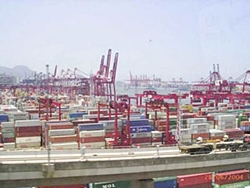BANGKOK, July 25 –Thailand’s exports and imports this year will stabilise at 10 per cent following the pattern of normalisation of trade growth in the region as a whole, according to a new United Nations report released here on Monday.
Thailand’s trade by late 2010 recovered fully, with exports growing by some 14 per cent and imports by 21 per cent, according to the Asia-Pacific Trade and Investment Report 2011: Post-crisis Trade and Investment Opportunities, a study published by the UN Economic and Social Commission for Asia and the Pacific (ESCAP).

Although previously fuelled by exports to the United States and the European Union, countries in the Asia-Pacific region are increasingly turning to the region itself as a source of demand for their goods and services. This shift from traditional trading partners to intraregional trade has allowed Thailand’s economy to recover from the crisis faster, the report said.
In 2010, nearly two-thirds of all Thai exports – 62 per cent — went to countries in the Asia-Pacific, while 64 per cent of Thailand’s imports came from the region. Compared to pre-crisis levels, Thailand’s export growth with the Asia-Pacific has doubled in terms of merchandise trade, from 16 per cent in 2008 to 31.6 per cent in 2010.
Thailand currently plays a critical role in Southeast Asian regional trade. Ranked second in trade in exports of goods and services, Thailand’s share of merchandise trade in Southeast Asia is roughly 17 per cent while its share in commercial services is 20 per cent in imports and 15 per cent in exports.
In the greater Asia-Pacific region, Thailand’s trade share is only 3.5 per cent and it is ranked eighth in terms of merchandise trade and commercial services trade.
With the recovery in global trade, Thailand was able to end 2010 with a positive trade balance of $12.9 billion. A highly open economy, Thailand’s share of exports to GDP stood at 57 per cent in 2010.
Although Thailand has been able to keep the effect of rising oil prices low due to state price controls, as the international price of oil continues to climb Thailand, like the rest of the Asia-Pacific region will continue to face rising oil costs that can curtail economic growth, the UN report warned.




